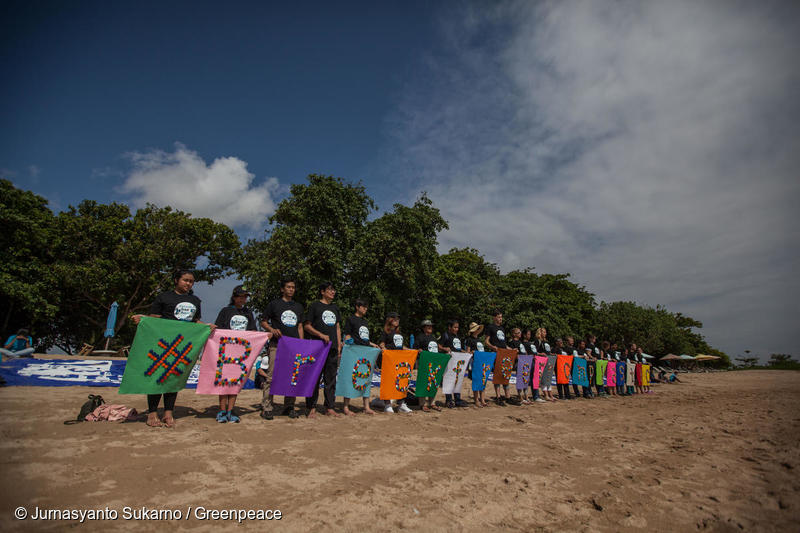FOR IMMEDIATE RELEASE
Nusa Dua (Bali, Indonesia), October 29th — At a side-event organised by Ocean Conservancy and Circulate Capital, companies exposed as the world’s Top Polluters by the recent #breakfreefromplastic brand audit report committed funds to a new “catalytic capital fund” to “solve” the plastic pollution crisis. Coca-Cola, Unilever, Procter & Gamble, and PepsiCo — all in the top 10 of corporate brands found on plastic pollution worldwide — sat alongside Dow, one of the world’s largest producers of plastic, as self-identified “frontrunning” corporate leaders working to tackle plastic pollution through improved waste management and technology.
Global #breakfreefromplastic Coordinator Von Hernandez states, “Plastic is pollution the minute it is made. The problem with plastic pollution is not one of waste management or ocean leakage; rather, the problem is that there is simply too much plastic being pushed upon us by industry than can be safely and properly dealt with. In any crisis, the most important action is how you address the source of the problem.”
The very corporations pushing these inadequate solutions are at the same time pumping an overwhelming amount of plastic into markets across the world with no responsibility or intention for the plastic after its initial use.
If these companies are serious about addressing plastic pollution, they must significantly decrease and ultimately eliminate single-use plastics. For a start, these corporations should disclose publicly the amount of plastic each of them is pushing into local markets and waste management systems across the world, and accept regulations instead of making weak, voluntary commitments. This ‘catalytic capital’ would be better invested in alternative delivery systems for products which don’t require single-use or plastic overpackaging. (See Leadership Challenge to Corporate Plastic Polluters of #breakfreefromplastic)
Experts on the ground in cities and communities have already innovated on zero waste solutions to improve local collection and waste prevention systems, and expose problematic products. Examples can be found around the world — in the Philippines, Indonesia, India, across Europe, the US — for a fraction of the cost. For example, one zero waste project in the Philippines averages at $2.30 per person per year.3
Global Alliance for Incinerator Alternatives (GAIA) has estimated that an initial influx of $30 million could provide zero waste programs for the entire Metro Manila area over two years. Corporations should be investing capital to support and replicate these solutions.
As the major contributors to the plastic pollution crisis, these companies should pursue true innovation in plastic reduction, instead of the same inadequate waste management approaches. Only then will we truly #breakfreefromplastic.
###
NOTES
- ‘Branded: In Search of the World’s Top Corporate Plastic Polluters’ details the results of 239 cleanups in 42 countries on 6 continents. The report was released on October 9, 2018. http://bit.ly/brandauditreport2018
- On the eve of the 2018 Our Ocean Conference, the #breakfreefromplastic movement has released a challenge to the Top Polluters identified in the global brand audit to pursue real solutions to the plastic crisis, not the same hollow commitments and empty gestures. Read more here: http://bit.ly/2D6YhVN
- http://www.no-burn.org/whatawaste2-0/
#breakfreefromplastic is a global movement envisioning a future free from plastic pollution. Since its launch in September 2016, nearly 1,300 organizations from across the world have joined the movement to demand massive reductions in single-use plastics and to push for lasting solutions to the plastic pollution crisis. These organizations share the common values of environmental protection and social justice, which guide their work at the community level and represent a global, unified vision.
CONTACT DETAILS
- Jed Alegado, +63917-6070248, jed@breakfreefromplastic.org
- Sherma Benosa, +63920-9038511, sherma@no-burn.org
- Claire Arkin, +1 9734444869, claire@no-burn.org
- Matthew Franklin, +44 7923 37 38 31, matt@breakfreefromplastic.org




